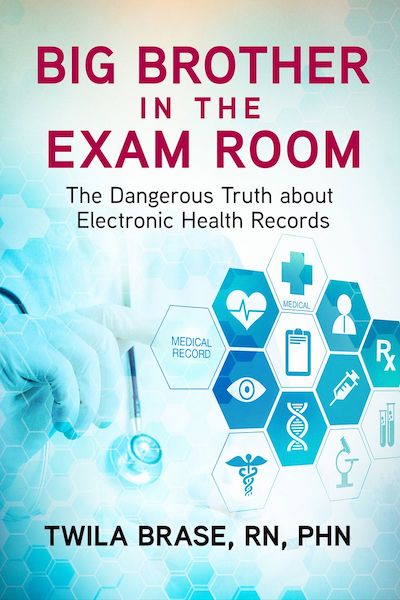 The following is a guest blog post from Seth Berkowitz, MD, who authors many of the innovative apps in the BIDMC Crowdsourcing program: Beth Israel Deaconess Medical Center, a teaching hospital of Harvard Medical School, has developed BIDMC@home, a new app for engaging patients using Apple’s CareKit and ResearchKit frameworks and the HealthKit API. The app provides a flexible framework to help patients manage their health from home, as directed by their physicians. The app will be piloted in several specific patient populations and will eventually be offered to BIDMC’s entire network of over 250,000 patients...
The following is a guest blog post from Seth Berkowitz, MD, who authors many of the innovative apps in the BIDMC Crowdsourcing program: Beth Israel Deaconess Medical Center, a teaching hospital of Harvard Medical School, has developed BIDMC@home, a new app for engaging patients using Apple’s CareKit and ResearchKit frameworks and the HealthKit API. The app provides a flexible framework to help patients manage their health from home, as directed by their physicians. The app will be piloted in several specific patient populations and will eventually be offered to BIDMC’s entire network of over 250,000 patients...
data collection
See the following -
10 of Today's Really Cool Network & IT Research Projects
University at Buffalo and Northeastern University researchers are developing hardware and software to enable underwater telecommunications to catch up with over-the-air networks. This advancement could be a boon for search-and-rescue operations, tsunami detection, environmental monitoring and more. Sound waves used underwater are just no match for the radio waves used in over-the-air communications, but the researchers are putting smart software-defined radio technology to work in combination with underwater acoustic modems...
- Login to post comments
3 NSA Veterans Speak Out On Whistle-Blower: We Told You So
In a roundtable discussion, a trio of former National Security Agency whistle-blowers tell USA TODAY that Edward Snowden succeeded where they failed. Read More »
- Login to post comments
5 Civic Projects Aim To Make Data Useful
How can we use data to improve our lives, our communities, and the world at large? At the recent Microsoft Design Expo, students from eight universities showcased design projects along the theme of “making data useful.” Read More »
- Login to post comments
5 Things To Know About The NSA Court Ruling
A District Court decision that the NSA's sweeping data collection program is unconstitutional paves the way for a Supreme Court review of the counterterrorism program, and creates a major headache for the Obama administration in the process. Read More »
- Login to post comments
After West Disaster, News Study Finds U.S. Chemical Safety Data Wrong About 90 Percent
Even the best national data on chemical accidents is wrong nine times out of 10. A Dallas Morning News analysis of more than 750,000 federal records found pervasive inaccuracies and holes in data on chemical accidents, such as the one in West that killed 15 people and injured more than 300. Read More »
- Login to post comments
Antibiotics And The Meat We Eat
SCIENTISTS at the Food and Drug Administration systematically monitor the meat and poultry sold in supermarkets around the country for the presence of disease-causing bacteria that are resistant to antibiotics. These food products are bellwethers that tell us how bad the crisis of antibiotic resistance is getting. And they’re telling us it’s getting worse. Read More »
- Login to post comments
Apple Announces Advancements to ResearchKit
Apple today announced advancements to the open source ResearchKit framework that bring genetic data and a series of medical tests typically conducted in an exam room to iPhone apps. Medical researchers are adopting these new features to design targeted studies for diseases and conditions that affect billions of people around the world and to gather more specific types of data from participants. “The response to ResearchKit has been fantastic. Virtually overnight, many ResearchKit studies became the largest in history and researchers are gaining insights and making discoveries that weren’t possible before,” said Jeff Williams, Apple’s chief operating officer...
- Login to post comments
Benefits of Patient-Generated Health Data to EHR Use
Patient-generated health data has the power to improve patient care, not just by completing EHR data, but by empowering the patient to engage in their own health. Between completing EHR information and empowering the patient as a part of the care team, patient-generated health data has the potential to be an integral part of enhancing the overall care for an individual...
- Login to post comments
Beth Israel's CareKit App Leverages FHIR for Patient Engagement
- Login to post comments
Cardiologist Eric Topol on Why We Need to Map the Human Body and “Go Deep” with Big Data
 This year’s Big Data in Biomedicine conference included a passionate talk from cardiologist Eric Topol, MD, of The Scripps Research Institute. Topol, who has been named one of the most influential physician leaders in the United States, described in gripping detail what’s wrong with medical care today and why we need to move forward to the kind of individualized medicine that can make for healthier individuals and healthier populations...
This year’s Big Data in Biomedicine conference included a passionate talk from cardiologist Eric Topol, MD, of The Scripps Research Institute. Topol, who has been named one of the most influential physician leaders in the United States, described in gripping detail what’s wrong with medical care today and why we need to move forward to the kind of individualized medicine that can make for healthier individuals and healthier populations...
- Login to post comments
CCHF Unveils Book Warning of "the Dangers of Electronic Health Records" at the FreedomFest 2018 Conference
 A new, groundbreaking book from Citizens’ Council for Health Freedom (CCHF) will expose how the mandated, government-certified EHR technology (CEHRT) has negatively affected both doctors and patients. Written by CCHF president and co-founder Twila Brase, RN, PHN, and published by Beaver’s Pond Press...Brase’s extensively researched work shows how and why Congress forced doctors and hospitals to install a data-collecting, command and control surveillance system in the exam room. It also includes the impact of EHRs on privacy, patient care, costs, patient safety and more, according to doctors and more than 125 studies....This week, Brase is unveiling “Big Brother in the Exam Room” at FreedomFest 2018 at the Paris Resort Las Vegas. Brase will be a part of several panels and will introduce the book to fellow freedom-loving patriots who recognize that rights also extend to health care...
A new, groundbreaking book from Citizens’ Council for Health Freedom (CCHF) will expose how the mandated, government-certified EHR technology (CEHRT) has negatively affected both doctors and patients. Written by CCHF president and co-founder Twila Brase, RN, PHN, and published by Beaver’s Pond Press...Brase’s extensively researched work shows how and why Congress forced doctors and hospitals to install a data-collecting, command and control surveillance system in the exam room. It also includes the impact of EHRs on privacy, patient care, costs, patient safety and more, according to doctors and more than 125 studies....This week, Brase is unveiling “Big Brother in the Exam Room” at FreedomFest 2018 at the Paris Resort Las Vegas. Brase will be a part of several panels and will introduce the book to fellow freedom-loving patriots who recognize that rights also extend to health care...
- Login to post comments
Clones Welcome in Scientific Hardware
 In the inaugural issue of the Journal of Open Hardware I review emerging business models for open source hardware. Many of these models are borrowed from the free and open source software industry and will no doubt be familiar to you. However, traditional companies should also take a close look at adding open source hardware to their strategy. One way a company can start the transition to the open source way is to open source a single product to drive sales of its other products. A firm can open source the hardware they sell in order to expand the market of other parts of their product line...
In the inaugural issue of the Journal of Open Hardware I review emerging business models for open source hardware. Many of these models are borrowed from the free and open source software industry and will no doubt be familiar to you. However, traditional companies should also take a close look at adding open source hardware to their strategy. One way a company can start the transition to the open source way is to open source a single product to drive sales of its other products. A firm can open source the hardware they sell in order to expand the market of other parts of their product line...
- Login to post comments
Coalition: Meaningful Use Stage 3 Must Focus On Care Disparities
Last week the Consumer Partnership for eHealth — a coalition of more than 50 consumer, patient and labor groups — published an action plan aimed at ensuring that Stage 3 of the meaningful use program focuses on health care disparities, Healthcare IT News reports. Read More »
- Login to post comments
Crowdsourcing Linked Open Data For Disaster Management
This paper shows how Linked Open Data can ease the chal- lenges of information triage in disaster response efforts. Recently, disaster management has seen a revolution in data collection. [...] Read More »
- Login to post comments
Dadaab: Using Mobile Technology For Large Surveys In Emergency Settings
In August 2011, Internews led a joint communication and information needs assessment with Radio Ergo / International Media Support (IMS) and Star FM of Kenya, with significant support from the Norwegian Refugee Council (NRC). This assessment aimed at understanding the information needs of refugees in Dadaab and exploring ways to improve the flow of communication between refugees, aid agencies and host communities. Read More »
- Login to post comments